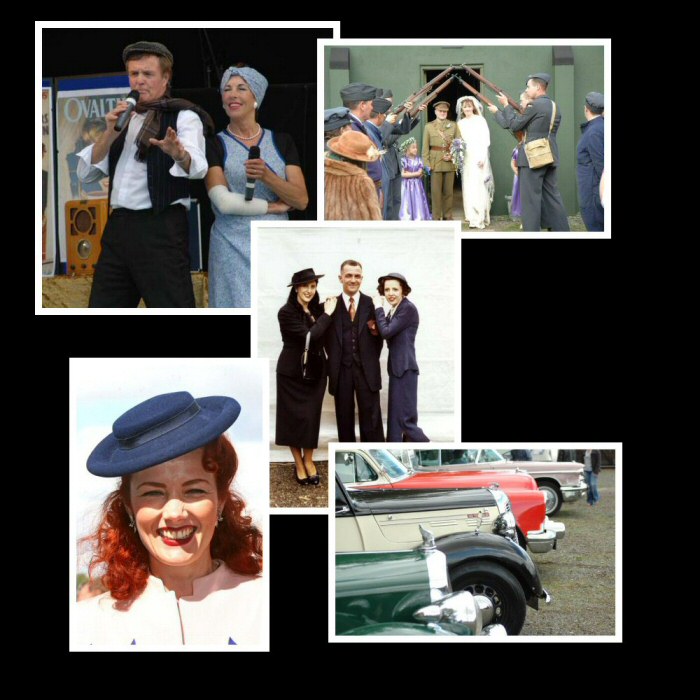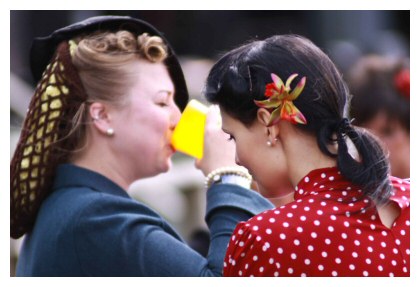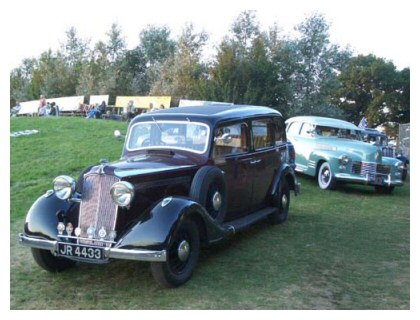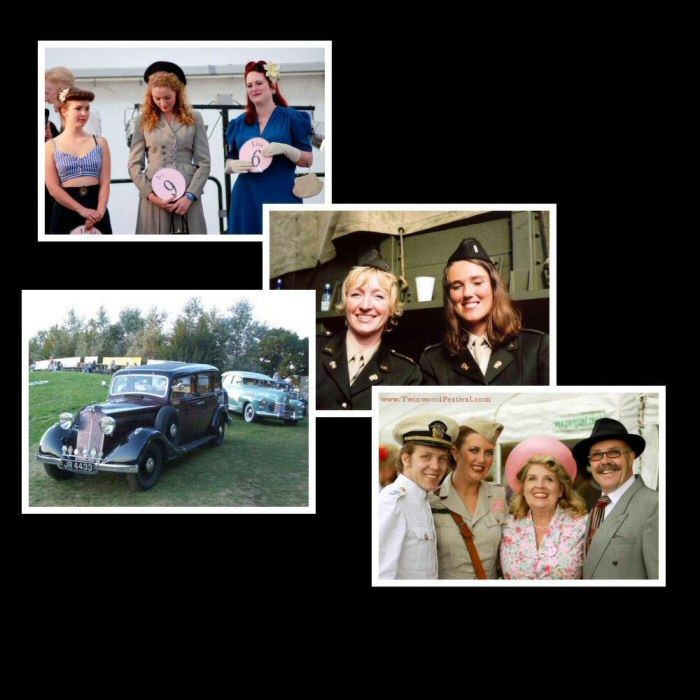Digger:
Hi David and Liz. My partner Avril and I came down to this
yearís Twinwood and we had a great time. It was a really
good day. Great music and a great atmosphere.
David: That's good to hear.
Digger: That's
a great location and position you've got there at
Twinwood.
David: Weíre up high on an airfield.
Liz: In previous years people have said that we have a
microclimate because weíve been warm when everywhere else
has been cold.
David: I think a measure of how successful we are is that
we had the biggest crowd when the weather was lousy and
nobody could even fly in it. Most years though the weather
has been fantastic. And in 2012, weíre having a
massive marquee put up which weíre calling The Colonial
Club. That will be done up in art deco style. Weíre
featuring Max Raabe
and one of his performances will be in there.
Digger: Is the idea there to be weatherproof?
David: The idea is to provide more things to do for people
both in the daytime and at night. And then the knock-on
effect of that is youíve got more shelter. Itís primarily
there to give people more to do, because a festival is an
eclectic mix of things to do. Thatís what weíre aiming at.
Thereís just one or two extra things weíre going to do
next year.
One or two of the nightclubs will get some changes and
additions. The site is finite in terms of size and
we can only get so many people on it and there's only so
much we can do.
Digger: Do the grounds belong to you?
David: Yes, we own it.
Digger: And where does the name Twinwood come from? Is it
from your family name in some way?
David: No, itís all coincidence. Our name is Wooding, we
live at Brownís Wood Farm, the festival is Twinwood at
Twinwood Road. We do burn a lot of wood! Wooding actually
means 'the family of wood' so itís fitting that we run the
Twinwood Festival. Itís quite a famous wood, because in
the middle thereís a clearing where they originally did
the testing for the Harrier jump jets. That was developed
up there at the RAE, which is next to Twinwood airfield.
Digger: Youíve got Cardington on the other side of Bedford
where the airships were made and launched in the thirties
and then up the road there's Bletchley Park. Thereís quite a
vintage and wartime theme going on in this neck of the
woods!
David: Theyíve also got all the wind tunnels at the RAE which
were originally used for the V2. After the war they were
all brought back here to the UK.
Liz: They realised that the German technology was so
advanced...
David: Red Bull racing are now using one of the old German
wind tunnels.
Liz: ... when the British and Americans originally found the
testing sites, the British thought they could use it for
their space programme. But the Americans pinched all the
space scientists and took them to America and developed
NASA. So we were left with just the aircraft stuff.
Digger: We did quite well with the aircraft post-war Ė the
Comet, Concorde, Harrier and so on.
David: Yes, thereís a vertical wind tunnel up there and
itís used these days for the world skydiving championships.
Digger: You say Twinwood has been going for ten years?
David: 2011 was the tenth anniversary. The reason that it
started was that Glenn Miller took his last fateful flight
from Twinwood in 1944 and did his one and only performance
to an RAF audience outside in August 1944. When the BBC
announced that they were broadcasting from ďSomewhere in
EnglandĒ during the war, that was actually Bedford. All the
entertainment was there Ė Bing Crosby, Bob Hope, Glenn
Miller, The Andrews Sisters, David Niven. They all used
Twinwood to fly into and out of so the Twinwood control
tower was the departure lounge for the stars on a daily
basis.
Digger: Thereís quite a forties and fifties thing going on
around here, isnít there?
David: Thatís why we opened up the museum ten years ago
and we had a concert with the Glenn Miller Orchestra UK in
the arena. It was built originally for show jumping and we
did a few shows there and we did a concert that was
so successful we said ďRight, weíll carry on doing it.Ē
Itís now on an annual basis. It was originally called The
Glenn Miller Festival and it still is called Twinwood
incorporating the Glenn Miller Festival. Itís always over the
August Bank Holiday and it usually coincides with the day
when Glenn Miller last played there.
Digger: The forties and fifties people seem very devoted,
don't they?
David: Itís a passion. Itís been around for a long time.
Digger: They seem more loyal somehow...



David: Youíve got your hardcore of forties and fifties
followers. Liken it to a football team like Northampton Ė
itís got 3,000 supporters. When itís doing well and it
becomes fashionable it sells out and gets 10,000. The
vintage forties and fifties scene has got a hardcore
audience and that doesnít change terribly but what has
changed is that a fashion has come along where young
people are into vintage. So now it has gone mainstream by
default. What will happen in a few years time is that it
will go back to the hardcore, but a lot of the young people
who have come along because itís fashionable will have
seen what swing music and the sceneís all about will stay
with it. So it will increase.
Digger: And thereís a bit of natural wastage with the
older generation.
David: Youíve got old people who donít attend much these
days, the hardcore who tend to be middle-aged and then a
lot of young people. Itís peaking, I donít know when it
will peak and then it will drop to a level. But it will be a higher
one than it was before.
Digger: Youíve seen a steady rise since you started?
David: Yes, every year.
Digger: I have noticed it generally too since I started this
in 2001. Retro and vintage seems to be popular on all
fronts.
David: I think thereís several reasons. People like to
look back to the good things about the 1940s and they
forget we had a war going on then. The good things were
people were more respectable and respectful, people
dressed better and they had better manners. A lot of
people hark back to that and itís almost like youíre
setting the clock back when people come to the festival.
To a nicer time, although itís a contradiction in truth as
there was nothing nice about being bombed or wondering
what was happening to your loved ones.
Digger: What sort of feedback are you getting from the
businesses that show there and the acts and how do you
deal with feedback?
David: We get a lot of positive feedback and this year we
had no negatives. None. Which was amazing. Over the ten
years weíve had a fair bit of criticism, some good, some
bad, some irrelevant and what youíve got to do is listen
to what everybody says and try and sift out the important
ones that mean something. You do get people who have got a
grudge for one reason or another and will make an adverse
comment. There are some who are jealous because they run
their own shows and come to ours and realise how good ours
is and they donít like it, which is a bit of a stupid thing
really. You just disregard those. There are people like
that.
Digger: What gives you most fun and enjoyment from
Twinwood?
David: Itís the year preparing it. It takes twelve months
to prepare the festival and thatís full on.
Digger: Thatís amazing, isnít it?
David: Itís virtually every day of the year and itís
getting the preparation right, planning it and putting it
on. Thatís what itís all about, itís not about the show
itself because we donít see the festival. Iím usually
dashing around fighting metaphorical fires, although
sometimes actually (Laughs) Thatís what gives me the
satisfaction.
Digger: Itís totally a family affair?
David: Yes.
Digger: So itís got quite a future. Itís already
established as the biggest and you have your children who
have taken over the reigns. How has it achieved being the
biggest vintage festival David?
David: Itís giving people what they want. Itís doing the
best that you can within your budget and itís also
important to keep the ticket prices, bar prices and food
prices sensible for the working man. If you compare us
against some other stows and festivals, we are good value.
Some festivals go from the thirties right through to the
nineties and thatís spreading the net a bit thin. Saying
the nineties is vintage is open to argument. We will stay
focused on the forties and fifties. As far as weíre
concerned, when people stopped dancing together and
dressing well then thatís as far as we want to go. Our
festivalís all about people getting together and dancing
together, men and women dancing proper dances, looking
good and feeling good. That stopped in the mid-sixties
when they stopped wearing these big dresses with
petticoats and then things like Twiggyís fashions came in.
All the other stuff that we like stopped and everyone
became very hippy.
Digger: Followed by unisex and glam and punk and disco?
David: Yes. Nobody danced together anymore and nobody dressed
up and I canít see the point of going into that. Having
said that, youíve got to listen to your audience, but I
canít see our audience being remotely interested in going
to that stage.
Digger: And we have people like Dita Von Teese
and M Bublť to thank for their contributions to the boom
in vintage interest.
David: Yes.
Digger:
What has been your biggest achievement and what would you
still like to accomplish?
David: What weíd like is to reach a standard of music that
appeals to everybody who is interested in vintage, the
older ones, the middle aged and the younger people as
well. Because all these younger people coming into
vintage, in my view, donít necessarily appreciate the
older music. They like the fashion, they like the look,
they like the scene but they still like the modern music.
Digger: So they're not
listening to the Andrews Sisters etc?
David: No. If you
said to a twenty five year old girl who comes to Twinwood
Festival who is dressed in all vintage clothing
"Who's your favourite artist?" They probably say somebody
like Rihanna, Beyoncť or Katy Perry or someone like that.
That's the reality,
Digger: They can't enjoy
both?
David: They'll enjoy
swing music when they're there, but that's not what
they'll buy.
Digger: When I was at
the Isle of Wight 'Bestival', it was predominantly
youngsters and a lot of them were playing things like Matt
Monro and Frank Sinatra on their music players. There
doesn't seem to be any snobbery about music (and the music
of our parents) like we had in our day.

David: That's true.
Digger: The forties and
fifties were very different from each other but Twinwood
covers both...
David: Yes and no. We
had come out of the war so there was a lot of optimism.
But there was also austerity. That's probably one of
the golden eras of our culture in the last century in
every respect. Everybody had great expectations, industry
was doing well, everything was on the up and we were
working hard. As far as the music and the dance was
concerned, it merged in. There was no such thing as a
forties scene and a fifties scene. Big bands were in the
thirties, forties, fifties and very early sixties. No
difference - the same music and dancing.
Digger: We tend to
pigeonhole into decades, don't we?
David: Yes, but you can't do
that. The only difference was that in the forties we had a
ruddy war and in the fifties we were getting out of it. So
there was depression in the thirties and forties and
optimism in the fifties. Then Rock and Roll came along,
but even then there was music similar to Rock and Roll in
America in the forties.
Digger: Yes, you're
right. If you
watch the movie A Matter Of Life And Death, for example, there's the courtroom
scene in heaven, with the British and American defence and
prosecution battling it out, where they play some music
from BBC radio and it's very Rock and Roll.
David: Our festival
is based on thirties to the late fifties. This year we've
got The Pasadena Roof Orchestra and Max Raabe. Max is
absolutely fabulous and because The Pasadena Roof Orchestra
are playing stuff from the twenties and the thirties, they
appeal to the Germans. Most of their gigs are in Germany
and their offices are even in Germany. Max Raabe is
obviously German, from Berlin.
Digger: Do you get many
Germans coming over for the event?
David: We have one or
two but we expect more next year.
Liz: We get a lot of
Europeans. Dutch and Scandinavians, but Dutch mainly.
David: I don't think there's much of a
German forties scene for obvious reasons. And they
probably don't celebrate the fifties either, because of the
Russian occupation and so on. They still felt bad about
things then so their vintage scene is the twenties and
thirties. The German visitors coming over next year will probably
find it quite amusing to see people strutting around in
uniforms.
Digger: It will be
interesting to see what the Germans are dressed up in.
David: We actually get loads
of people dressed up in German uniforms. We don't
encourage it, though, and medals and insignia are certainly not
allowed. If people want to re-enact, and some do, then we
have an area in the woods where they can indulge in that
and anyone who wants to watch can specifically head down
to the woods to see it. We have a lot of veterans at the
festival and we must show them the greatest respect. You
have to be careful to let people have fun and not to
offend people as well.
Digger: I can see you're
both very sensitive to that. So what do you think the
future holds for vintage?
David: I think people are
going to be more into the vintage with the recession -
Secondhand fashions, particularly the women. The number of
vintage markets out there are now is amazing and people love
buying old stuff.
Digger: It used to be
called hand-me-down or secondhand stuff.
David: Not these
days. Good vintage items are much sought after.
Digger: You had a lot of
vintage stalls there this year.
David: Yes, loads of them.
It's all
vintage markets these days, vintage is very valued and has become
highly-fashionable. It's very female-led. But Twinwood
remains all about the music and dance. And nobody comes close
to our standard for live music.
Digger: Or for the
authenticity of the event. It was like going back to the
forties and fifties.
David: That's very
nice.
Digger: Best of luck for
Twinwood 2012 David and Liz. And I look forward to seeing you
there.
David and Liz: Thanks
David.
|